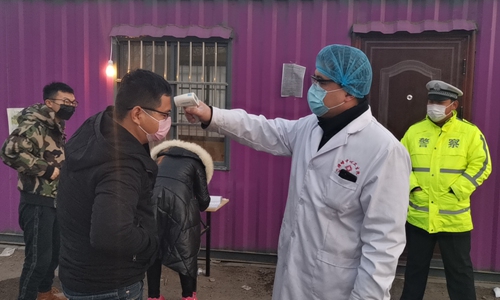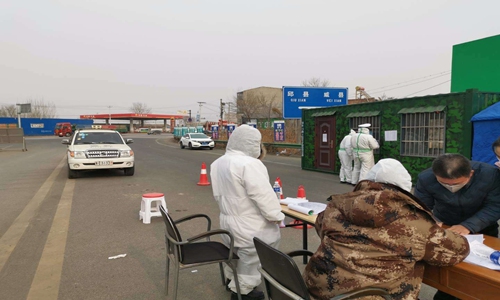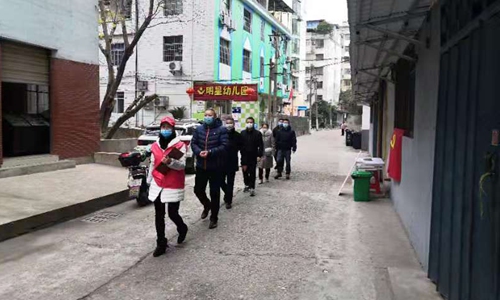Community grid system helps China fight virus

A medical officer tests the temperature of a passerby on Monday at a crossing in Guangzong county, Hebei Province. The check point was set up by the local government to screen possible patients whose body temperature was abnormal. Photo: Zhang Xiya
Community grid management, a nationwide social governance system in China that aims to improve the government's efficiency to actively find and solve problems for people among populous regions, is playing a crucial role in helping the country to fight the novel coronavirus epidemic.
The community grid management system was first initiated at the Third Plenary Session of the 18th Central Committee of the Communist Party of China (CPC) in 2013 for building a better, more efficient and modernized platform for social management and services. It was intended to divide populous urbanized areas into "grids," or various blocks and communities, to let high-tech digital platforms, social volunteers and local police jointly and actively find and handle social issues for the residents, so that the management and service over the whole society could be improved, news website people.com.cn reported.
Currently, as the whole country is fighting the coronavirus epidemic, the Global Times reporters learned from various provinces, cities and municipalities that the grid management system is playing a crucial and essential role in mobilizing different forces to better serve the patients, locate suspected infected residents, educate and help people to prevent infection, distribute medical materials and daily necessities, and maintain public order.
However, this kind of new innovation regarding social management in China has been criticized and distorted by some Western analysts during media interviews like the Financial Times and the Voice of America. They said that the system is made to revive "a state presence in residential life that had receded as society liberalized in recent decades," especially in some regions such as Tibet and Xinjiang.
Song Luzheng, a political science expert at the China Institute of Fudan University in Shanghai, said that the reason why some Western scholars and media outlets hold such suspicious attitudes toward the grid management is that in their culture, the values of liberalism are dominant. The state is a "necessary evil" and its presence must be contained, otherwise it infringes on the rights of individuals.
"But in China's culture and political tradition, the state, the Party and the people have shared interests. So that's why some foreign observers and media will misunderstand or even demonize this system, because they are using their own standards and values to judge eastern civilizations which are very different from their own."

Photo:Zhang Xiya
How it works
There are 93,100 people living in the 6.24-square-kilometer Daning Road subdistrict, of which 23,400 are nonnative residents. Markets, commercial plazas, railway stations and nearly 3,000 enterprises are located there. The grid management system has assisted the local government agencies in handling situations more efficiently. The system enables nationwide instructions, policies and rules to reach every resident in this lively and busy area, which is beneficial for authorities and the public together in preventing and controlling the spread of the virus, the street office staffer Yang Rong said.
The system enables nationwide instructions, policies and rules to reach every resident in this lively and busy area, which is beneficial for authorities and the public together in preventing and controlling the spread of the virus, the street office staffer Yang Rong told the Global Times Monday.
Shanghai is regulating residents to register with local neighborhood communities to buy medical masks from Sunday. With the help of the grid management system, Daning Road subdistrict was able to quickly inform all of its residents and collected registration information across all of its 24 neighborhood communities, Yang said.
In Fengcheng, a county-level city administrated by Dandong city in Northeast China's Liaoning Province, since January 26, the second day of the Lunar New Year, all civil servants have been working around the clock, especially with those at the community, village and county level government agencies, according to the local authorities.
Their daily routine work includes dispatching virus-related scientific popularization booklets to every household in their administration areas to increase disease prevention awareness, help clarify rumors about the epidemic, and work at designed areas to take temperatures of passers-by and allow for timely registration of those who had come back from Hubei Province, according to a local official, who asked not to be named.
So far, there have been no reports of confirmed cases in Fengcheng, however, everyone remains on high alert, she said.
A community worker in southern Beijing surnamed Zhang told the Global Times on Tuesday that she had returned to work on Spring Festival Eve and has not taken a day off since.
Zhang and her colleagues were first tasked with contacting people who recently came back from Wuhan or had close contacts with such people, which in only a few days evolved into gathering travel and health information on everyone in her area, making phone call after phone call to roughly 600 families.
Starting Friday, community workers began to seal off entrances to residential communities, leaving only one or two open to measure body temperatures and register people who came and went.
Sometimes there will be people who are not willing to cooperate, and community workers had to put forward explanations. But some would make complaints to Zhang's superiors, to which Zhang feels wronged by.
"This job is very tiring, both physically and mentally, especially in the freezing wind," Zhang said. "But I'm responsible for my area, and I can't let people become exposed to the viral threat," she said.

Shangrao in East China's Jiangxi Province sends out nearly 12,000 grid members into streets and lanes to carry out epidemic prevention publicity work, register residents and prevent crowds from gathering. Photo: Courtesy of local official
Modernized measures
The grid management system is extremely crucial in Wuhan, capital of Central China's Hubei Province, where the outbreak started and still suffering from the most serious situation in the county.
Wuhan-based residents told the Global Times that the local authorities have organized massive volunteer squads, mainly consisting of CPC members, to work with state-run digital online platforms to locate infected people and provide immediate treatment and conduct quarantine since January 25.
"Previously, when people reported fever, they would arrive at hospitals via cars or pubic transport. Now, the government has banned private transportation and cut off connections between individuals and hospitals, which is difficult to organize and would increase the risk of cross-transmission, but it was replaced with a more efficient and secure mechanism," said a person who requested anonymity.
When people discovered that they had fever-like symptoms, they could remain at home and reported on a mobile phone app called "Wuhan Wei Linli" (meaning Wuhan online neighbors), which the government told residents to install, and then the app will provide an online immediate diagnosis, some locals noted.
Once suspected infected persons have been verified, they will be located immediately by the app, and the nearest volunteers will receive instructions and relevant information, then they will arrange specific transportation to send the infected persons to the hospital for further treatment, tests or quarantine.
The app will update information about the patient's situation, inform people who live in the same community as the suspected cases, then the volunteers will arrange professional personnel to conduct disinfection work in the residences of the infected patients and also quarantine their recent contacts.
Song noted that if foreign observers learned accurately how the grid management system operates in the fight against the coronavirus, they may change their suspicious views, as they will have a better understanding about the importance of state presence in maintaining public order.
"The community grid management system is a modernized governance innovation in China. Facts prove that it is not an authoritarian machine designed to keep surveillance on people in Xinjiang and Tibet, but that it's a crucial advantage for the state to better serve their people, whether in normal times or serious situations," he noted.